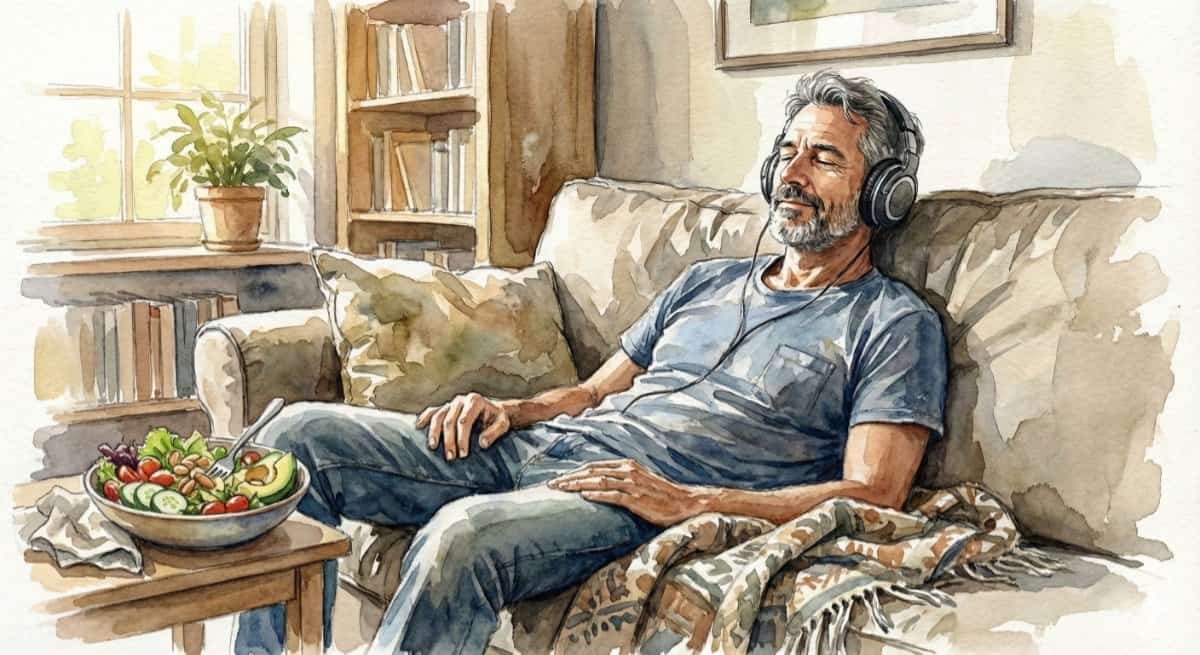Table of Contents
The Simple Things That Aren’t So Simple
There are five things that keep this old dog functioning well, though I wouldn’t call myself an expert on any of them. I notice when they’re out of balance—everything feels a bit harder, a bit cloudier.
Not groundbreaking wisdom, just observations from someone who’s learned to pay attention to what actually makes a difference in daily life. I’m not here to tell you what to do. I’m just sharing what works for me, hoping it might resonate if you’re trying to figure out your own steady state.
Sleep: My Biggest Challenge
If I lack discipline with any of these, it’s sleep. Late nights on the computer working on this blog, early morning coffee trips to 7-Eleven—I know better, but sometimes the pull of “just one more post edit” wins over common sense.
When I don’t get enough sleep, everything feels harder. My patience with myself thins, my body aches more after farming, even simple decisions make me overthink.
I’ve learned this lesson repeatedly, yet I’m still learning to actually apply it consistently. The difference between a good night’s sleep and a restless one shows up in everything from my mood to my ability to handle whatever the day throws at me. The body is less forgiving in these later chapters, so a good early night can really make a difference.
Movement: More Than I Realized
I cycle to work, which gives me regular movement without thinking about it. I walk for fresh air, mental clarity, and to slow down a little. Maintaining an upright posture while walking provides a good stretch after cycling or sitting. But what really shakes off the cobwebs and mentally resets me is jogging—something I need to do more consistently.
At my age, staying slim and maintaining mobility feels like a gift I shouldn’t take for granted. Between the ages of 19 and 21, I struggled with bulimia, so I’ve always had a complicated but respectful relationship with exercise and health.
The farming work gives me something different than cycling or walking—honest physical labor that leaves me tired in a satisfying way. There’s something about working with my hands in soil that indoor exercise can’t replicate.
Connection: Work as Community
Social life for me happens mostly through work, which suits me fine. Teaching gives me regular human interaction, farming connects me with my bosses and the land. I don’t need much beyond that.
Over the past twenty-plus years, a work-based community has been enough. Real conversations with coworkers and students, the quiet camaraderie of working alongside others—it keeps me connected without draining my introvert batteries.
Nourishment: Honest About 7-Eleven Living
I should probably be embarrassed to admit this, but I’ve lived out of 7-Eleven for many years, supplemented by bread and peanut butter from the supermarket.
Not exactly the picture of optimal nutrition, but it works for my lifestyle and budget. I notice how different foods affect my energy and sleep, but I’ve found a routine that keeps me functioning rather than thriving nutritionally.
It’s honest living, if not ideal living. (Jason Statham’s onto something with his nutrition discipline.)
Stillness: The Reset Button
Taking time away from the noise—stepping outside, giving myself space to breathe—isn’t luxury for me, it’s maintenance.
Tomorrow I’ll be working in a greenhouse for a few hours, which offers the kind of stillness my mind craves. When everything else feels like a waste of time, I research spiritual topics like OBEs and NDEs. It helps me reset the same way good sleep, physical labor, or teamwork does. These quiet moments aren’t about productivity; they’re about perspective.
The Daily Rhythm
These basics connect to the deeper work of finding sustainable balance after 50. What strikes me most is how these five areas show up differently depending on what kind of day I’m having.
Farming days versus teaching days require different energy, different clothes, different versions of myself. As I mentioned in my post about secretly wanting a makeover, I’ve transitioned to a more carefree, less formal style. I have secret respect for working outside—it feels far more authentic than various indoor jobs I’ve held.
Little did I realize when I was trying to impress people in offices years ago that deep inside was a dirty old farmer just dying to get out.
The Transition Challenge
The only thing I have to thoughtfully consider is transitioning from farming one day to teaching the next. By about 4:30 PM on farming days, I’m ready to go home and prepare for the formalities of teaching.
I really need both jobs—farming for exercise and wellbeing, teaching for communication so I don’t lose my social skills. If I had plenty of money, I’d probably be okay farming all the time. But this regular switching serves me well at this stage of life.
What Age Has Taught Me
Something I’ve learned as I’ve gotten older: I don’t worry about as much as I did when I was young.
Wearing casual clothes, being less formal at work—for most people, it doesn’t matter. Some will judge, of course, but so long as customers keep coming, a less stressed attitude seems equally rewarding and productive.
It was good to learn the formal approaches when I was younger. But now I understand that everyone is just a person. So long as we can help and serve others, we don’t need to put them on pedestals like my younger self would have.
Finding Your Own Steady State
These five areas work for me, but your version might look completely different. Maybe you thrive on more social interaction, need different types of movement, or have found better ways to fuel your body and soul.
(I should probably have added one more. Music! Writing this now, I’m listening to my Daily Mixes on Spotify, usually dance, electro, and trance-type anthem remixes.)
The key needn’t be perfection—it could be noticing what actually makes a difference in how you feel and function, and then being honest about which areas need more attention and which ones are doing OK.
What keeps you steady? Do you have your own version of these basics, or have you found completely different things that work for you?

Share your thoughts below. I respond to every comment, and your experience often helps others more than mine does.





